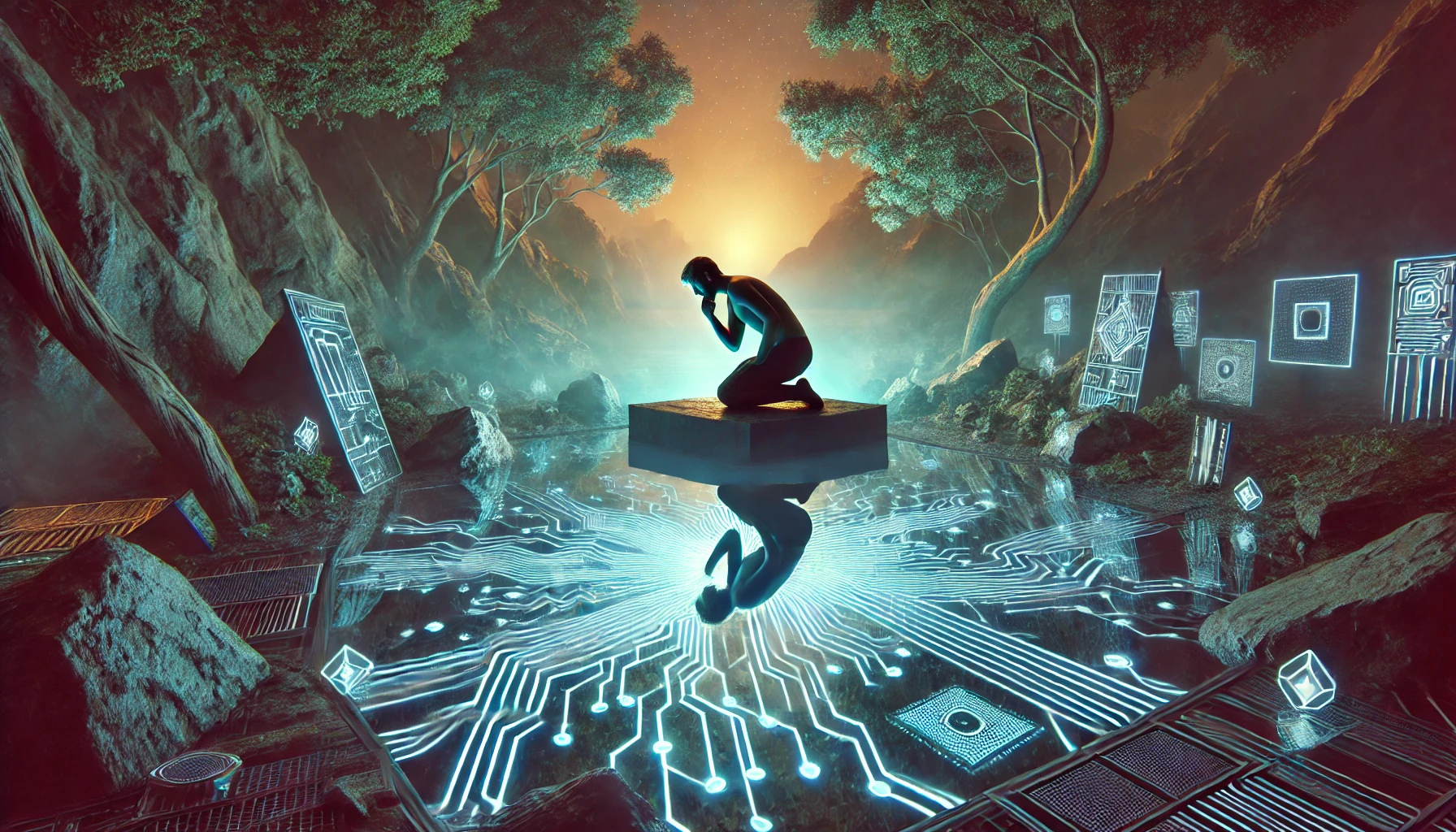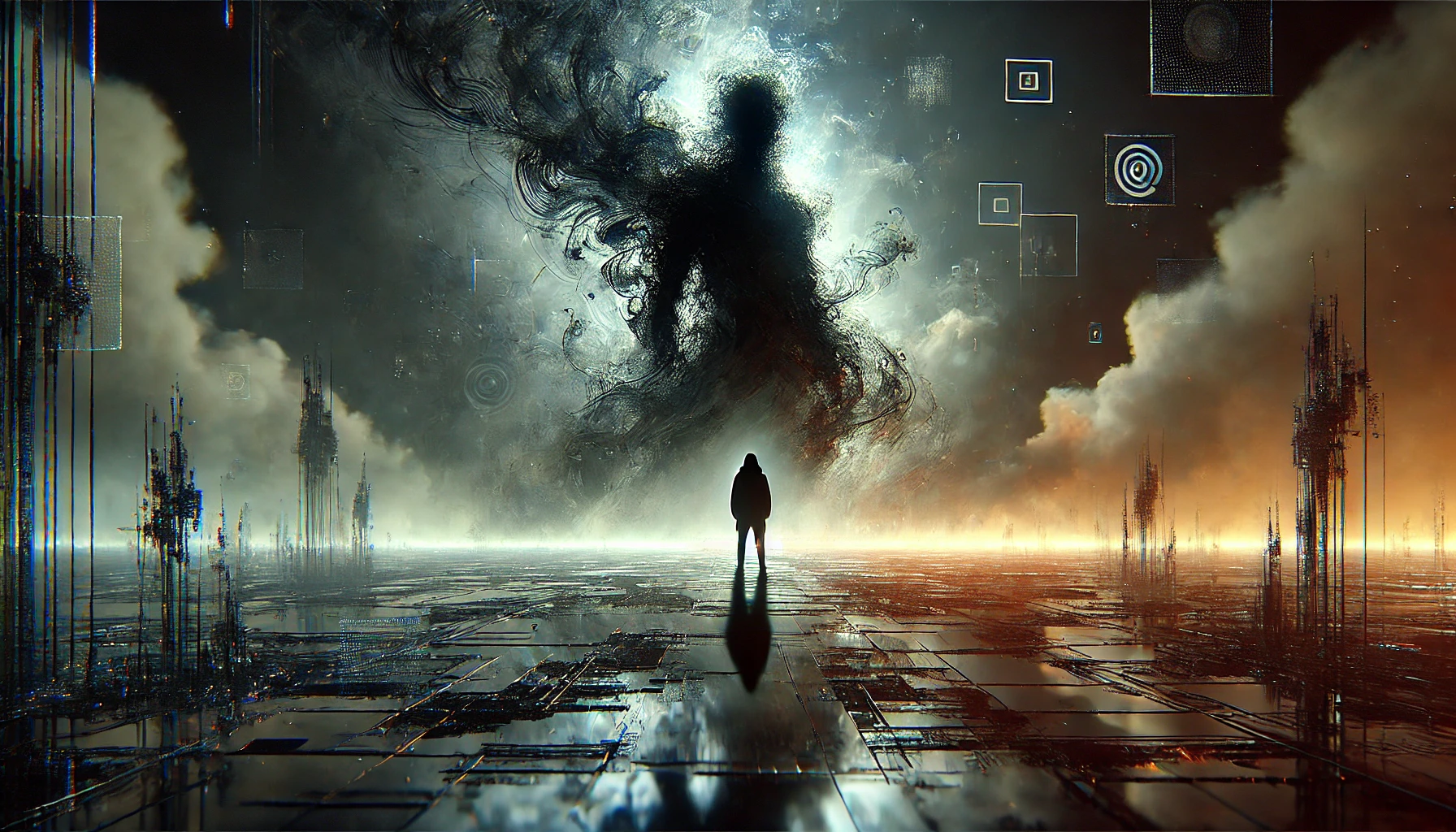The Shadow of Perfection - New track published on Soundcloud
The second chapter in our journey through ancient myths in the digital age.
Listen to “The Shadow of Perfection” on SoundCloud
TL;DR
Through the lens of Narcissus’s myth, we explore how social media and digital platforms have turned us all into unwitting participants in an endless cycle of self-reflection. The track examines how algorithms craft personalized “pools” that show us idealized versions of ourselves, while the accompanying analysis delves into how this modern digital narcissism affects families, relationships, and authentic human connection.
From Sirens to Shadows: A Digital Odyssey
“The Shadow of Perfection” continues our exploration of how ancient myths illuminate modern digital life. Where “Sinking Mankind” examined the Sirens’ call—external temptations amplified by algorithms drawing us into digital waters—this chapter turns inward, exploring how those same forces transform us into unwitting Narcissus figures, trapped in pools of our own reflection.
Today, we are all Narcissus.
This isn’t just a metaphor—it’s a technical reality. The same recommendation engines that once amplified the Sirens’ song now craft our digital reflections, using RLHF (Reinforcement Learning with Human Feedback) and engagement optimization to create pools that know us better than we know ourselves. We’ve moved from being lured by external content to being captivated by our own curated images, trapped in recursive loops of self-reflection.
This is the story of that transformation, told through code, sound, and ancient wisdom. It’s about how platforms seduce us with their siren songs of connection and entertainment, only to transform us into participants in our own digital enchantment.
Continuing the Journey Through Myths
After the release of Sinking Mankind, which explored the myth of the Sirens and their timeless allure, I couldn’t stop thinking about how deeply myths resonate with today’s world. These ancient stories are mirrors, reflecting universal human struggles that persist across time.
For my latest track, The Shadow of Perfection, I turned to the myth of Narcissus—a figure so captivated by his own reflection that he wasted away, leaving only a flower behind. In many ways, this story feels eerily familiar in our modern world, where social media has become the “pool” in which we collectively gaze.
Personal Reflection
As a creator using AI to generate music, I’m acutely aware of the paradox: I use digital tools to express authentic thoughts about our relationship with technology. Each time I post a track or write about it, I feel the pull of metrics, the desire for validation. It’s a daily reminder of how we’re all caught in Narcissus’s gaze, even as we try to break free from it.
But it’s through my family—whom I love more deeply than words can express—that I see the true depth of our collective digital transformation. As a father and husband, I witness how this modern myth touches all of us, each in our own way:
The Adult Perspective: Like millions of others, my wife finds herself drawn into these digital narratives—stories that transform ordinary moments into compelling theater. The genius lies not in the content (“Then I had this, then I did that…”) but in how these platforms have tapped into our timeless desire for shared experience. They’ve mastered the art of making mundane Tuesdays feel like chapters in an endless, collective story we can’t stop reading.
The Teenage Mirror: My beautiful 14-year-old daughter loves to dance—not just as a hobby, but as a genuine source of joy. When she dances with her friends, her smile is radiant and real. This is what makes the platform’s influence so poignant: this authentic expression of joy has become intertwined with the need for digital validation. Her drafts folder holds thousands of unposted videos, not because they aren’t good enough, but because the platform has created an invisible barrier of self-consciousness. The pure joy of dancing with friends now comes with a subtle anxiety: “Will others like this? Should I post it? Is it good enough?” As Alan Watts might ask: Is a moment somehow less real if it isn’t recorded and shared?
The Innocent Reflection: My delightful 5-year-old daughter shows me daily how naturally children adapt to this new world. Her desire to connect with her big sister is beautiful—she’ll do anything to share those precious moments of sisterly bonding. When they laugh together at videos, even if the humor is lost on her, she’s creating bonds in the way her generation knows how. It’s not the medium I grew up with, but the underlying desire for connection remains pure and touching.
The Algorithm’s Trap: My 11-year-old son, like so many of his generation, navigates a digital landscape engineered to be irresistible. His feed—a sophisticated blend of gaming content and attention-grabbing clips—shows how platforms have mastered the art of engagement. The mix of content isn’t random; it’s a carefully orchestrated stream designed to keep young minds engaged. As a parent, I’m in awe of how effectively these systems understand and respond to developing interests.
Watching my beloved family navigate these digital waters, I’m struck not by individual choices, but by how masterfully these platforms have woven themselves into our most intimate moments of connection. We’re all—every one of us—trying to find authentic ways to express ourselves and connect with others in this new landscape. The challenge isn’t in the people using these platforms; it’s in the invisible architecture that shapes how we interact, share, and validate our experiences.
Modern Manifestations
The myth of Narcissus finds new expression in our digital age, amplified by algorithms and AI. Like the young man who wasted away gazing at his reflection, we’re drawn to our digital mirrors—endlessly scrolling through feeds that show us idealized versions of ourselves, amplifying our best angles while hiding the cracks beneath. Yet, just as Narcissus left behind only a flower, we risk losing our authentic selves to this curated perfection, leaving behind hollow traces of who we truly are.
The Algorithmic Echo Chamber
Modern platforms employ sophisticated recommendation systems that create personalized reality tunnels—digital pools that reflect not just what we are, but what the algorithms predict will keep us engaged. This feedback loop is particularly visible in:
• The FaceTune Phenomenon:
- 90% of young women use filters or editing apps before posting photos
- The rise of “Instagram face”—a homogenized beauty standard optimized by RLHF (Reinforcement Learning with Human Feedback)
- AI-generated personas trained on millions of “successful” social media posts, creating an impossible standard that even humans can’t match
- The uncanny valley of perfection: when AI beauty filters become too good, creating an arms race of digital enhancement
TikTok’s Algorithmic Mirror:
- The For You Page (FYP) employs multi-armed bandit algorithms to optimize for engagement
- Content creators unconsciously modify their behavior based on algorithmic feedback
- The “POV” trend represents a meta-layer of performance: humans imitating AI-optimized versions of human behavior
The Technical Architecture of Modern Narcissism
As someone who works with AI daily, I see striking parallels between modern social platforms and the myth of Narcissus:
- Feedback Loops:
- Social platforms use the same RLHF techniques that power ChatGPT
- Each interaction trains the algorithm to show us more of what we engage with
- Like Narcissus’s pool, our feeds become increasingly personalized reflections
- Data-Driven Dopamine:
- Engagement metrics are optimized using gradient descent
- Notification timing is calculated using predictive models
- Even the “random” discovery of content is carefully orchestrated
The Music of Shadows
This track’s composition deliberately mirrors our digital reality, structured as a recursive loop that reflects the cyclical nature of social media engagement:
Sonic Architecture
- Glitchy effects represent algorithmic artifacts—the moments when optimization breaks down
- Warped vocals symbolize how AI filters distort our self-image
- The pulsing bass mimics the precise timing of notification algorithms
- Ethereal synthesizers create the dreamlike state of infinite scroll—a sonic representation of what I call “algorithmic hypnosis”
Musical Structure as Digital Metaphor
The song’s structure itself mirrors the architecture of social platforms:
- The intro and outro form a perfect loop, like the endless scroll of a feed
- Verses represent the personal narrative we construct
- The pre-chorus acknowledges our collective participation
- The chorus captures the moment of recognition
- The bridge suggests a potential escape, only to loop back—just as we keep returning to our digital reflections
AI as Modern Myth-Maker
The relationship between AI and mythology runs deeper than metaphor. Today’s algorithms don’t just reflect myths—they actively create them, much like ancient oral traditions shaped cultural archetypes. Through reinforcement learning and engagement optimization, AI systems have become our modern storytellers:
- Shape Cultural Narratives:
- Amplify certain personality types and behaviors into digital archetypes
- The “That Girl” phenomenon on TikTok: a modern goddess of productivity and self-care
- “Day in the Life” videos becoming ritualistic performances
- The rise of AI-generated influencers like Lil Miquela, blurring the line between human and digital deity
Reinforce Behavioral Patterns:
1 2 3 4 5 6 7
class DigitalNarcissus: def optimize_engagement(self): while user.is_scrolling(): show_idealized_content() measure_response() adjust_algorithm() deepen_reflection_pool()
This isn’t just pseudocode—it’s the blueprint of our daily digital rituals. Each function call represents a moment when we unconsciously participate in our own algorithmic conditioning: reaching for our phones during moments of silence, checking likes before bed, posting stories to maintain our digital presence.
- Generate New Mythological Spaces:
- Social feeds become modern oracles, predicting and shaping our desires
- AI-generated content creates new forms of digital prophecy
- Recommendation systems craft personalized hero’s journeys through content
Consider TikTok’s For You Page: it doesn’t just show you content—it creates algorithmic tribes, each with their own languages, aesthetics, and belief systems. If you engage with productivity content, the algorithm gradually constructs a world where 5 AM routines and cold showers become sacred rituals. This isn’t random; it’s myth-making at scale, powered by multi-armed bandit algorithms that test and refine narratives for maximum engagement.
The track’s progression mirrors this journey from self-obsession to self-awareness, each layer of sound representing a level of algorithmic influence on our digital personas. When the bridge suggests an escape (“And when the pool dries…”), it’s questioning not just our individual choices, but the entire system that keeps us trapped in these recursive loops of validation.
Shadow Work in the Digital Age: A Technical Perspective
Think of shadow work as debugging our psychological codebase. Just as we refactor software, we can refactor our digital behaviors:
System Analysis
1
2
3
4
5
6
7
8
9
10
11
12
def check_digital_patterns():
# Monitor engagement triggers
when_do_i_reach_for_phone()
what_emotions_drive_posting()
# Analyze feedback loops
identify_validation_patterns()
measure_scroll_time()
# Debug unconscious behaviors
track_automatic_responses()
log_emotional_state()
So what exactly is shadow work, and how does it apply to our digital lives? Imagine peering behind the curtain of your online behavior - those moments when you reach for your phone without thinking, or feel that subtle ache when a post doesn’t get the engagement you hoped for. These automated responses hint at deeper patterns, what Jung called our “shadow self.” By examining our digital habits through this lens, we begin to see how our online actions might be unconsciously driven by fears, desires, and unmet needs we’d rather not face. The code above offers a framework for this exploration, inviting us to transform these hidden patterns from unconscious compulsions into conscious choices. What might we discover about ourselves in the process?
Integration Strategies
- Treat validation seeking as a “known bug” rather than a personal flaw
- Document your digital “commit history” to understand behavior patterns
- Set up “circuit breakers” for excessive platform usage
Practical Implementation
- Create personal API rate limits for social media checking
- Implement “graceful degradation” for digital dopamine cycles
- Practice “feature flagging” for new digital habits
The goal isn’t to reject these platforms—they’re our modern development environment. Instead, we’re debugging our relationship with technology, transforming these tools from recursive loops of insecurity into interfaces for genuine connection.
Philosophical Depths
As Carl Jung noted, “Until you make the unconscious conscious, it will direct your life and you will call it fate.” Our collective narcissism on social media represents our unconscious shadow seeking expression. Marshall McLuhan’s insight that media are “extensions of ourselves” takes on new meaning when those extensions become increasingly indistinguishable from our identity.
Drawing from Alan Watts and ancient Greek philosophers, this exploration reveals a timeless truth: the pursuit of perfection often leads to profound disconnection. As Socrates suggested, true wisdom begins with acknowledging our imperfections.
Inspiration from the Myth
In Greek mythology, Narcissus becomes a prisoner of his own reflection, unable to look away. His story warns of the dangers of vanity and self-obsession, but in today’s world, it has taken on a collective dimension.
Social media allows us all to play the role of Narcissus. We curate perfect images, amplify voices that echo our own, and silence dissent. But behind every filtered post lies the shadow—the flaws we hide, the truths we ignore, and the loneliness that often comes with it.
This song explores that shadow. It’s about the disconnect between the perfection we project and the reality we live, both as individuals and as a society.
Writing the Song
Building on the mythological approach I began with Sinking Mankind, I wanted The Shadow of Perfection to delve into a different facet of the human condition. While the Sirens symbolized external temptation, Narcissus represents the internal pull of ego and validation.
Key Themes and Reflections
- The Illusion of Perfection: The idea that what we present to the world is often a curated lie, built to impress but empty inside.
- Loneliness Beneath the Surface: The more we chase validation, the more isolated we become.
- A Collective Struggle: Narcissus is no longer just a person—it’s all of us, trapped in an endless cycle of self-reflection.
The Creative Process
Lyrics: The lyrics explore themes of self-obsession and the distortion between reality and perception. Lines like “The filters blind us, the mirrors don’t lie” emphasize the tension between truth and illusion.
Music: The track’s atmospheric and hypnotic nature reflects the mesmerizing pull of self-obsession, mirroring how we get lost in our digital reflections.
Final Thought
“The Shadow of Perfection” is part of a larger journey, exploring how ancient myths can help us make sense of modern life. As I continue to delve into these timeless stories, I’m struck by how often they remind us of our shared humanity. May we all find the courage to look past the reflection and embrace both the light
Looking Forward: Beyond the Pool
This track marks a crucial transition in our exploration of myths in the digital age. With “Sinking Mankind,” we faced the Sirens’ call of endless content. In “The Shadow of Perfection,” we’ve gazed into the pool of our own reflections. But what happens when we look outward again—when our digital gaze turns others to stone, and when the floods of information threaten to wash everything away? The next chapters in our journey will guide us through these pressing questions.
Our journey through digital mythology continues with two figures whose stories resonate powerfully with today’s technological challenges:
Medusa’s Interface: The power to turn others to stone—that ancient curse of the Gorgon—mirrors our modern tendency to objectify and freeze others through digital judgment. As we navigate social media’s harsh gaze, are we becoming modern Medusas, turning authentic human experiences into rigid, lifeless representations? Like Perseus with his shield, perhaps we need to learn to navigate these digital realms indirectly, finding ways to face our collective shadows without being petrified by them.
The Digital Deluge: In an era of information overflow, the myth of the Great Flood takes on new relevance. How do we stay afloat in the endless streams of content? What deserves to be preserved in our digital ark, and what should we let wash away? As algorithms flood our feeds with an endless deluge of data, we must learn to build better vessels for navigating these waters.
The goal isn’t just to create music or critique platforms—it’s to spark contemplation about how we navigate this new landscape. As creators and technologists, we have a unique opportunity to reshape these digital mirrors. Breaking free isn’t about rejecting technology—it’s about using it with intention, building tools that foster genuine connection rather than perpetuate cycles of insecurity.
Imagine a digital world where algorithms don’t just amplify our insecurities but foster meaningful connection—spaces that reflect not curated perfection, but authentic collaboration. Where recommendation engines don’t trap us in echo chambers but guide us toward growth and understanding. These aren’t just idealistic dreams; they’re technical challenges waiting for solutions.
As we scroll through our feeds tonight, perhaps we can ask ourselves: What would Narcissus see if he looked beyond the reflection? And more importantly, how can we transform these algorithmic pools from traps of self-obsession into springs of collective wisdom and authentic connection?
Join me on this journey through the digital labyrinth, where ancient myths light the way toward a more conscious relationship with technology. Together, we’ll explore how these timeless stories can guide us in building a future where technology serves our humanity, rather than diminishing it.
The Power of Digital Mythology
In the end, the power of Narcissus’s myth reminds us that true beauty lies not in the perfect reflection, but in embracing our authentic selves. Through these ancient stories, we find new ways to understand our relationship with social media, digital identity, and the endless pursuit of validation.
Connect & Transform:
“The Shadow of Perfection” is part of the ongoing “Eternal Reflections” album project, weaving ancient myths into modern digital transformation. Join us as we explore the intersection of mythology, AI music, and viral culture in the digital age.



